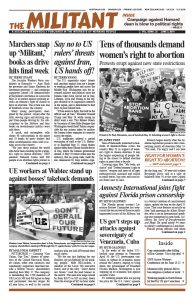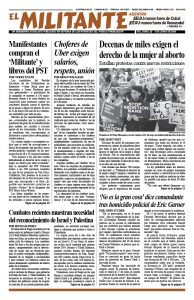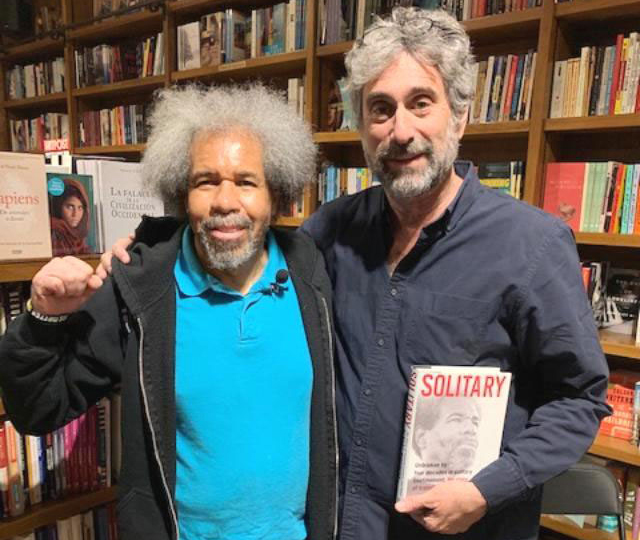The Florida prison system’s Literature Review Committee has overturned the ban on two of three recently impounded issues of the Militant, but in a blatant violation of constitutional rights, upheld the ban on the April 15 issue. That issue features an article on New York meetings for Albert Woodfox, who is on an international speaking tour promoting his new book, Solidarity: My Story of Transformation and Hope. He spent nearly 44 years in solitary confinement in Louisiana.
Florida prison officials had taken issue 15 from subscribers behind bars there, alleging the article “depicts, describes or encourages activities which might lead to the of use of physical violence” and presents a “threat to the security, good order, or discipline” of the prisons.
“There is nothing contained in the specific articles or pages from the banned issues of this publication that would amount to such a call,” Justin Mazzola, deputy director of research of Amnesty International USA, wrote to the Department of Corrections Literature Review Committee May 17. The human rights group called for an end to the repeated “arbitrary impoundment” of the Militant in Florida.
Censorship of the socialist newsweekly “violates the UN Standard Minimum Rules on the Treatment of Prisoners, otherwise known as the Mandela Rules,” named for Nelson Mandela, who spent decades in prison in South Africa because of his opposition to apartheid, Mazzola said.
Woodfox’s book and his tour are shining light on demeaning and abusive conditions that are rampant in jails and prisons across the country. At the meeting at the Brooklyn Public Library reported on in the banned Militant, Woodfox explained the prison system is designed to “break a man’s spirit.”
Far from promoting violence, Woodfox and others helped fellow prisoners recognize their own humanity. In his book and at his public meetings Woodfox describes how he and fellow inmate and Black Panther Herman Wallace formed an “anti-rape squad” at Louisiana State Prison, where rape and violence — often with the acquiescence if not open endorsement of prison officials — were routine.
They took new inmates under their wing, protected them and oriented them on how to avoid confrontations and violence in prison. And what they did made life inside the prison — notorious for its brutality — a little more humane.
Many of the Militant’s subscribers behind bars have written in to make sure the paper knew about the censorship. “It’s crazy, they think it’s OK to beat and mistreat us,” wrote one. “But it’s not OK for us to read about it.”
“The Militant get’s rejected for exposing the truth,” he added.
Another Florida prisoner, who is filing his own appeal of the ban, wrote, “The prison system fears what the Militant is exposing about the government as well as the prison system.”
“Thanks for your unconditional support of our right to receive your newspaper,” wrote another prisoner.
Woodfox’s tour and book have been written about extensively in the “mainstream” media, the Militant’s lawyer, David Goldstein, from the civil liberties firm Rabinowitz, Boudin, Standard, Krinsky & Lieberman, noted in his appeal of the impoundment.
The continuing moves by Florida officials to censor the Militant, Goldstein said, can only be because they disagree with the paper’s “political and ideological viewpoint.” And to force the paper “to expend substantial resources battling these ongoing unconstitutional and improper” bans.
Growing protests against censorship
Benjamin Stevenson, writing for the American Civil Liberties Union Florida, called on the Literature Review Committee to “comply with the Constitution and specify the reason for the rejections.” He called on the committee to overturn the bans. The National Lawyers Guild is also backing the fight against censorship.
“The Militant will never stop defending our constitutional right to reach our subscribers behind bars and their right to read the views of their choice,” said Militant editor John Studer. “And we find increasing interest in the Militant’s working-class political outlook and our readership is growing.”
The Militant has some 140 subscribers in prisons across the country, and offers reduced rate subscriptions to prisoners. Those who can’t afford it can request a free subscription.
 “The fight against impounding the Militant strengthens the fight against censorship of other periodicals and books,” Studer said. “Prisoners have the right to consider a wide variety of viewpoints, to make up their own mind, to be part of the world.”
“The fight against impounding the Militant strengthens the fight against censorship of other periodicals and books,” Studer said. “Prisoners have the right to consider a wide variety of viewpoints, to make up their own mind, to be part of the world.”
The Militant is urging readers to join the fight. Get co-workers, your union, church groups and others to write a letter to Florida prison officials calling on them to overturn the ban.


